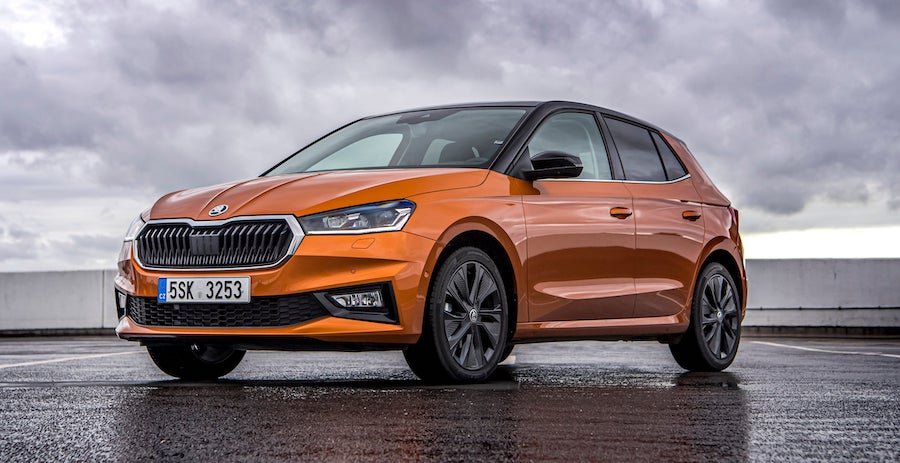Relaxed Euro 7 emissions rules would extend life of Skoda Fabia

A relaxation of the impending Euro 7 emissions regulations could see the lifecycle of the petrol-powered Skoda Fabia supermini extended well into the second half of the decade.
Several car company bosses have been vocal about how Euro 7 – due to be implemented in 2025 – threatens the viability of small, affordable combustion cars because making them compliant with strict new limits necessitates costly engineering work to fit electrically heated e-catalysts and new on-board diagnostic technology, which drives the cost of production up to impractical levels.
Indeed, Skoda boss Klaus Zellmer told Autocar earlier this year that "it will not be possible" to keep the Fabia on sale – at least at its current sub-£19,000 start price – if the plans went ahead.
Driving the list price past £20,000 to compensate for the increased cost of production, he suggested, would not be a "feasible proposal for customers".
But now, the European Commission is likely to water down the initial Euro 7 proposals following pushback from countries including Spain, Italy, France and the Czech Republic, who argued that they would impose significant costs on manufacturers for little environmental benefit, and divert investment away from the collective goal of all-out electrification.
Under the new proposals – yet to be ratified by the European Parliament and Commission – passenger cars would still be subject to the same limits imposed by the current Euro 6 standards, thereby substantially reducing the cost of compliance.
Zellmer, speaking to Autocar at the reveal of the new Skoda Kodiaq following the announcement of the less stringent Euro 7 proposals, hailed the potential move as "more realistic".
Asked if the combustion-engined Fabia could survive as a result, he said: "I wouldn't say they have saved it, but I think they have extended its potential lifecycle."
"It still has to be ratified in the legislative EU process, so we never celebrate too early," he added.
Zellmer stopped short of suggesting a projected retirement date for the current Fabia, which was launched in 2021 and would be up for renewal in around 2028, but did reveal that the Renault Clio rival could even return for another generation if conditions allow.
"We shall see," he said. "We have to keep the options open. Our principle is that we respect customers' preferences and we have to keep that avenue open. But let's see what consumer preferences will be in the next five to ten years."
Skoda sales boss Martin Jahn was equally optimistic about the supermini's survival, telling Autocar: “The original proposal from the European Commission last year would kill the A-0 [supermini] segment in the middle of 2025, which I think would be a pity because there is a big demand for these cars.
“If the European Parliament approves a version that’s close to what we have on the table today, then we can keep producing these cars, which I think is the right solution”.
Skoda could legally continue selling a pure-combustion version of the Fabia in the EU and UK until 2035, when manufacturers will be forced to sell only electric cars in both markets, the UK government having pushed back that cut-off date from 2030 last month.
Zellmer said the 2035 deadline is workable for Skoda, "because what we need as car manufacturers is a solid framework we can work in, and 2035 for us is a framework that we can adjust to, and manage our transformation to provide choice for consumers."
And he is reassured that Euro 7 may turn out to be less of an imposition than it was initially set to be. "If you want an example of where I was worried, and now I am less worried, it's EU7," he said.
"The draft that was initially published was, of course, a massive question mark in our engineering heads, because nobody knew how to technically do it, it wasn't defined how the requirements were going to be measured, whether you stick to them and not knowing exactly what that means - would add massive investment into cars that would then get more expensive - for a Fabia, €3000-€5000 more expensive.
"Now, we see that the EU actually listens. Everybody knows that if you make the cars too expensive, [motorists] will stay in their old cars. They're not going to go into EU7, they will stay in EU1, 2, 3, 4, 5 and 6. Then there's no effect for anybody, but you have developed cars that are difficult to sell."
"There might be people who would say 'why don't you just swallow the costs as a manufacturer?' But we need that money to manage our transformation to a CO2-neutral [company]."
Thomas Schäfer, CEO of Skoda sibling brand Volkswagen, had also earlier warned that Euro 7, as initially proposed, would make the Polo – closely related to the Fabia – unprofitable and thus unsustainable. It is unclear whether the looser rules could similarly extend the German car's lifecycle.
